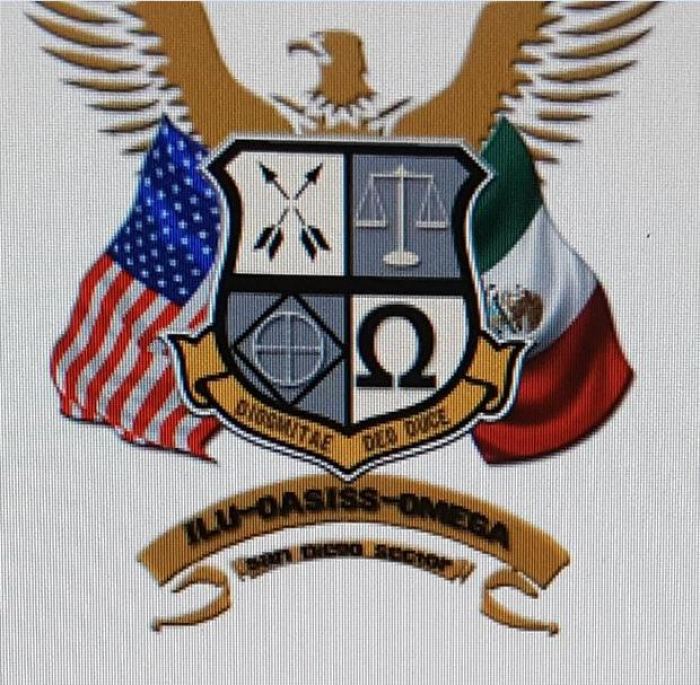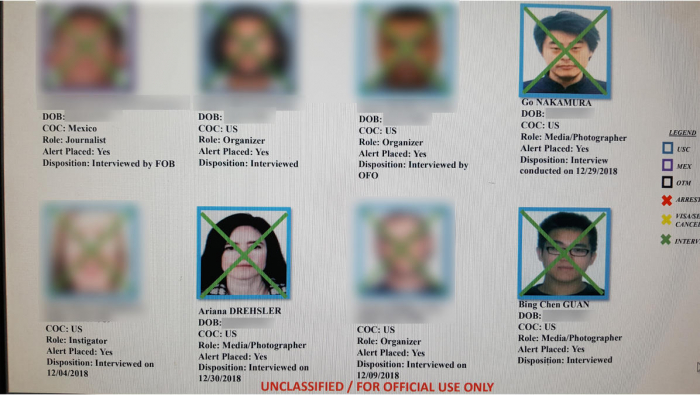Documents obtained by NBC 7 Investigates show the U.S. government created a secret database of activists, journalists, and social media influencers tied to the migrant caravan and in some cases, placed alerts on their passports.
At the end of 2018, roughly 5,000 immigrants from Central America made their way north through Mexico to the United States southern border. The story made international headlines.
As the migrant caravan reached the San Ysidro Port of Entry in south San Diego County, so did journalists, attorneys, and advocates who were there to work and witness the events unfolding.
But in the months that followed, journalists who covered the caravan, as well as those who offered assistance to caravan members, said they felt they had become targets of intense inspections and scrutiny by border officials.
One photojournalist said she was pulled into secondary inspections three times and asked questions about who she saw and photographed in Tijuana shelters. Another photojournalist said she spent 13 hours detained by Mexican authorities when she tried to cross the border into Mexico City. Eventually, she was denied entry into Mexico and sent back to the U.S.
These American photojournalists and attorneys said they suspected the U.S. government was monitoring them closely but until now, they couldn’t prove it.
Now, documents leaked to NBC 7 Investigates show their fears weren’t baseless. In fact, their own government had listed their names in a secret database of targets, where agents collected information on them. Some had alerts placed on their passports, keeping at least two photojournalists and an attorney from entering Mexico to work.
The documents were provided to NBC 7 by a Homeland Security source on the condition of anonymity, given the sensitive nature of what they were divulging.
The source said the documents or screenshots show a SharePoint application that was used by agents from Customs and Border Protection (CBP) Immigration and Customs Enforcement (ICE), the U.S. Border Patrol, Homeland Security Investigations and some agents from the San Diego sector of the Federal Bureau of Investigations (FBI).
The intelligence gathering efforts were done under the umbrella of “Operation Secure Line,” the operation designated to monitor the migrant caravan, according to the source.
The documents list people who officials think should be targeted for screening at the border.
The individuals listed include ten journalists, seven of whom are U.S. citizens, a U.S. attorney, and 48 people from the U.S. and other countries, labeled as organizers, instigators or their roles “unknown.” The target list includes advocates from organizations like Border Angels and Pueblo Sin Fronteras.
NBC 7 Investigates is blurring the names and photos of individuals who haven’t given us permission to publish their information.
The documents are titled “San Diego Sector Foreign Operations Branch: Migrant Caravan FY-2019, Suspected Organizers, Coordinators, Instigators and Media” and are dated January 9, 2019.
Emblazoned on it are the American and Mexican flags, with a banner that reads: "ILU-OASSIS-OMEGA." An official at the Department of Homeland Security said the seal indicates that the documents are a product of the International Liaison Unit (ILU), which coordinates intelligence between Mexico and the United States.

This seal is emblazoned in the leaked documents to NBC 7 Investigates.
For each person, the documents show their photo, often from their passport but in some cases from their social media accounts, along with their personal information. That information includes the person’s date of birth, their “country of commencement,” and their alleged role tied to the migrant caravan. The information also includes whether officials placed an alert on the person’s passport.
Some individuals have a colored “X” over their photo, indicating whether they were arrested, interviewed, or had their visa or SENTRI pass revoked by officials.
In addition to flagging the individuals for secondary screenings, the Homeland Security source told NBC 7 that the agents also created dossiers on each person listed.
“We are a criminal investigation agency, we’re not an intelligence agency,” the Homeland Security source told NBC 7 Investigates. “We can’t create dossiers on people and they’re creating dossiers. This is an abuse of the Border Search Authority.”
One dossier, shared with NBC 7, was on Nicole Ramos, the Refugee Director and attorney for Al Otro Lado, a law center for migrants and refugees in Tijuana, Mexico. The dossier included personal details on Ramos, including specific details about the car she drives, her mother’s name, and her work and travel history.
After sharing the documents with Ramos, she said Al Otro Lado is seeking more information on why she and other attorneys at the law center have been targeted by border officials.
“The document appears to prove what we have assumed for some time, which is that we are on a law enforcement list designed to retaliate against human rights defenders who work with asylum seekers and who are critical of CBP practices that violate the rights of asylum seekers,” Ramos told NBC 7 by email.
In addition to the dossier on Ramos, a list of other dossier files created was shared with NBC 7. Two of the dossier files were labeled with the names of journalists but no further details were available. Those journalists were also listed as targets for secondary screenings.
Customs and Border Protection has the authority to pull anyone into secondary screenings, but the documents show the agency is increasingly targeting journalists, attorneys, and immigration advocates. Former counterterrorism officials say the agency should not be targeting individuals based on their profession.
NBC 7 Investigates sent the information to all border and law enforcement agencies the source listed, asking whether the information was valid and if these tactics were legal.
A Customs and Border Protection spokesperson did not answer NBC 7’s list of questions or confirm the validity of the documents shared.
By email, the spokesperson said, “Criminal events, such as the breach of the border wall in San Diego, involving assaults on law enforcement and a risk to public safety, are routinely monitored and investigated by authorities.”
To view the documents, click here .
More about: documents
















































